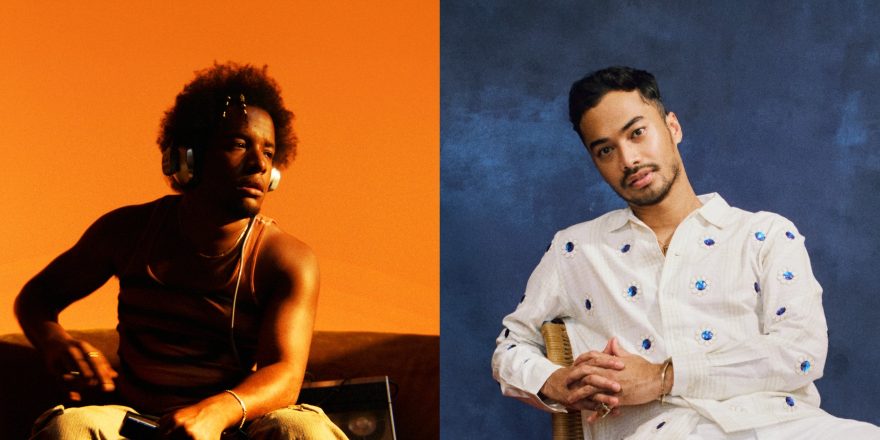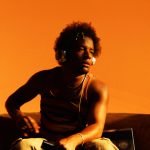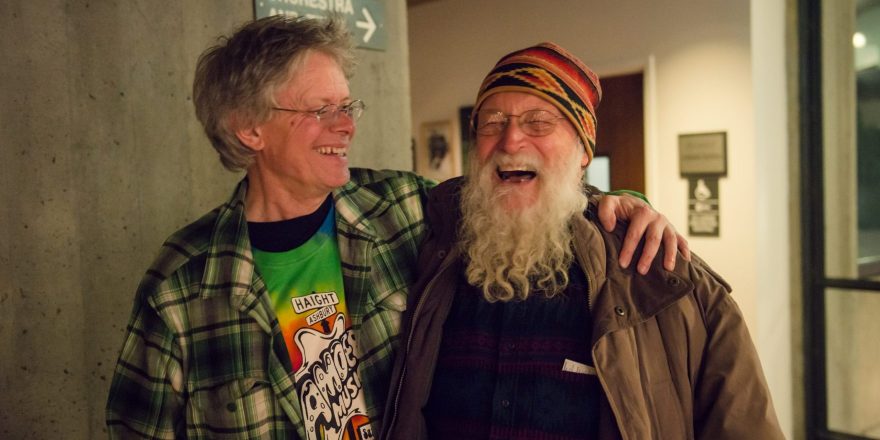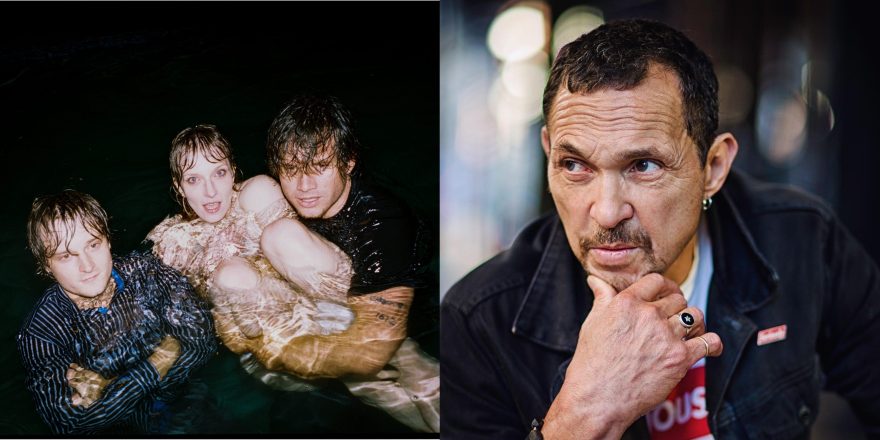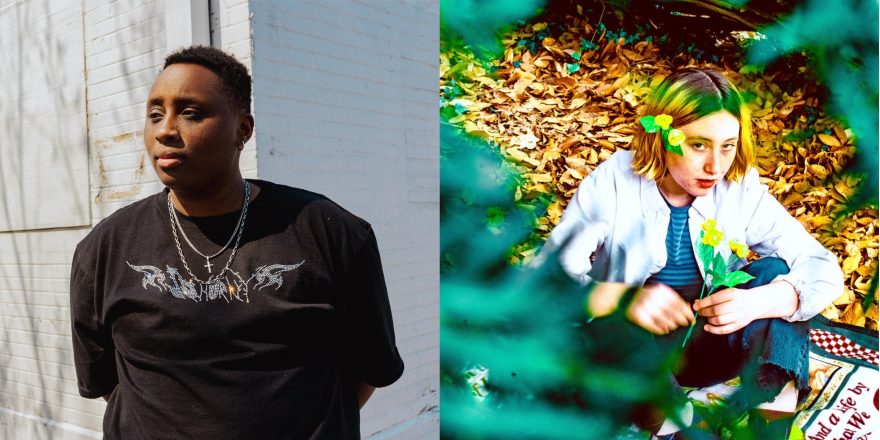Cautious Clay, aka Joshua Karpeh, is a singer, songwriter, and producer based in New York; Michaël Brun is a Haitian DJ and producer, and the founder of BAYO Festival. Cautious Clay’s new record, The Hours: Morning, just came out last month, and to celebrate he and Michael got on a call to catch up about it, and much more.
— Annie Fell, Editor-in-chief, Talkhouse Music
Cautious Clay: I think we met — what was it — 2019, maybe 2020?
Michaël Brun: Yeah, it’s been a minute now.
Cautious: So many different situations, so it’s cool to chop it up with you. You have obviously been doing a lot of production stuff since then. Whenever I see what you’re up to, I’m always so impressed with how you are able to navigate the artist thing, but then also the producer thing. I think for me, I’m just so much of an artist in the way that I think that I’ve sometimes had a hard time trying to level between being a producer or artist or both. I’m curious for you what that’s been like.
Michaël: It’s funny, because I’ve always viewed your stuff as being not tied to any specific genre, especially with the production. I feel like the times that we’ve worked on stuff together, and just seeing how you approach songwriting and production, it’s so open-minded. On my side, between the production side and my own artist project and DJing and working on BAYO, the festival that I have, I think it all just feels like an extension of me. Because it is an extension of me, even if it seemingly doesn’t all fit into the idea of it being my artist project. Whether I’m producing for other people or producing for myself, doing an event, DJing, it’s an expression of my creativity. And I guess that’s why I always related to what you did, because I saw your ability to blend genres and approach songwriting in so many different ways and play multi-instrumentalist, and then also produce so well. I felt like when we connected, it always felt like we understood each other.
Cautious: I honestly feel that way, too. Just having that curiosity and genuine appreciation for a multitude of music and the way that people make it I feel like is why we clicked so well from the beginning. We make a bunch of different stuff and always meet each other where we’re at and just see how everything shapes up… My father is Creole and their side’s from Louisiana, but my mother was born in Germany, and her parents are Liberian, so it’s still part of that diaspora as well; us talking about how everything sounded musically and relating that to my own experiences was super refreshing to me.
Michaël: Your family lineage — the Creole connection, the diaspora connection from West Africa — we spoke a bit about all that stuff. But I think jazz, whether people realized it before you did the jazz project [2023’s Karpeh] or not, definitely influenced you a lot, and it’s really cool because Haitian jazz as well is such a huge part of my culture. Growing up in Haiti, my dad had his band and my mom also played piano and violin. I also spent a lot of time in New Orleans later in my life. There’s so many connections in terms of Haiti’s musical lineage and history and New Orleans and the Creole sound that came out of that area, and the historical point of reference between everything that was going on in the Caribbean, everything that was going on in the South, and then all the diaspora West African stuff. It felt almost like family in a way. So that was another really cool thing, learning about your history and how much that influenced you.
Cautious: Yeah, man. That was a big part of that jazz project in general, that merging of family history with the super dense variety of music that came out of the diaspora, and jazz sort of being the origin point. It was really fun to be able to experiment with that and hear us coming to similar conclusions from different perspectives.
Even from a rhythmic perspective perspective, I’ve learned a lot just from traveling. You have different styles — you have soca, you have obviously dancehall, you have all different types of diasporic music that influence each other, and no one can really say where it’s coming from. I’m curious if you have thought about being sort of like a historian of it, or if it’s more of just vibes. What is your perspective on that?
Michaël: The general sentiment that I have when it comes to knowing the history of music is that you actually don’t need to know the history to enjoy it. I’ve seen people from all different parts of the world listen to Caribbean music, listen to Haitian music or soca or Jamaican dancehall or reggae. They listen to it and they don’t necessarily understand or even need to know the origin of it to get it. But when you do know the origin, it’s so rewarding as a listener, if you can find the points of intersection that have happened. One example that recently came up, since you brought up soca, was when I was working with this artist Kes, from Trinidad. He’s one of the biggest artists now in the world, and he’s such an amazing person. He was telling me some of the history of soca in Trinidad and how the music was birthed from the idea of revolution, because instruments were banned and the slaves at the time in Trinidad were not allowed to play any instruments. So the steelpan came from the oil rigs that were used — they literally started playing on the things that they were being exploited for, and that became their form of revolution, and it’s such an integral part of their sound. That’s the African drumming side, fusing the circumstances of the enslaved people in Trinidad at that time. That, to me, was so mind blowing. I had no idea.
Cautious: And that’s the marimba now, right?
Michaël: Yeah, yeah. That became their steelpan and the marimba and all these different percussive, tonal instruments. It’s just really incredible to find a genre like soca in Trinidad, and the fact that it’s so tied to revolution, and then thinking about jazz in the South, how that was birthed and in itself was a form of revolution, too. In terms of the immigrant stories that we learn about in history, you don’t usually get to hear the musical and the artistic side of it. And that’s been so fulfilling for me, getting to travel to all these places and have actions with these artists that are really influential in their spaces and learn about their world and how things exist — and then realize at the same time that, even if it’s a different part of the world, there’s so much in common with something that’s more familiar to me. Just because humanity in the end is always going to find a way to express itself. No matter what kind of obstacles might come in our way, we’re always going to express ourselves and create something beautiful.
Cautious: Man, that’s so real. I think also, people sometimes think of music as this thing that’s linear — like, “This influenced this, this influence that” — obviously we keep highlighting this whole jazz reference of being influential for multiple different types of music. But then you think of those examples where, you know, you have the marimba that was made off of these oil rigs that ended up turning into a real instrument, and how that relates to hip hop from the 2000s — obviously you have “P.I.M.P.” by 50 Cent, which has such a sick marimba part.
Michaël: Yeah.
Cautious: It’s iconic. But then you have — what’s the one song that’s like, [sings the melody].
Michaël: That’s Kodak Black.
Cautious: Yeah! I just love that marimba part. It has such a distinct sound and you’re just like, Wow, this was just an oil drum. That’s just the genius of people, man. Creating something out of nothing, and that something being so influential.
Michaël: And I think even talking about the origin of rap music and DJ culture in New York in the ‘60s and the ‘70s — it was all these immigrants from the Caribbean, right? Jamaican immigrants, Haitian immigrants, Puerto Rican immigrants: You have this fusion of these oppressed people in the US that literally fuses all of these things that came from their original cultures and then merges it with American culture and the fact that there’s all of these new things opening up. I think it’s so sick, that both DJs and hip hop originated from Caribbean immigrants. And I guess it’s not that random that I’m doing it, because my mom’s Guyanese and my dad’s Haitian. I learned a lot of this stuff after I’d already been making the music and been part of the scene. When you learn about that, it’s like, Oh, wait, it’s actually not that random. Kodak’s Haitian, so it’s not random that he would gravitate towards that. And then the history of rap music and hip hop and production and DJ culture is so intertwined. It’s really cool. It feels like evolution is just happening constantly, and if you want to learn about the history, it’ll make your listening even more rewarding. But you also don’t need to know any of this, and you can still really enjoy it.
Cautious: Man, that’s so real. At the end of the day, if it bangs, it bangs. If it’s emotional, it’s emotional, and you can just feel that. I think that’s the beauty of it: You can get however much out of it that you’re looking for. I get that feeling a lot even when I’m at a jazz show, where it’s like you’re supposed to have this uptight kind of vibe. At least, that’s the perspective that some people have about jazz. I don’t think that’s actually what it is. You hear somebody play a lot of notes, and sometimes it really is emotional, but it doesn’t have to be for everybody.
Michaël: I have a question for you: Especially in the beginning of your career, you really integrated a lot of electronic sounds into production. How did that come up? Where did where did that influence come from?
Cautious: I feel like we had similar experiences early on. I was mostly just a producer on SoundCloud for many years before I started singing and writing. I think that experience and that interest in electronic music came from those early experiences just making beats. Making things electronically was new and exciting for me at the time. It wasn’t the first thing that I was drawn towards — I was playing flute and saxophone, taking those classes. And I liked it, but the new frontier for me felt electronic music. I was influenced by what sounds I could make that felt somewhere between organic and electronic, and just paying attention to what I could draw out of it emotionally. I’m a very active listener when I have the bandwidth. I very much live in the moment that I’m in, and I try to just engage with that and put my full heart into it. With the music I put out, I think that’s what’s required for me to truly lock in with what I’m feeling. And think for me, it’s like phases. My last album was much more avant garde than this album that I’m putting out right now, and that’s not by accident. It’s the multitudes of sound that I love so much, and so I try to stay true to that and just have fun with it.
Michaël: That’s something I’ve always felt since the first time we met, that you’re very much present. I think it’s an amazing quality as an artist to be able to tap into the exact moment and energy that you’re in, and then be able to put it into the art you’re creating. I did always feel like the work that you’ve done is almost like poetic journaling. You’re telling these experiences that are very specific — and still very poetic and with a lot of subtext, a lot of things happening beneath every line that you write. And honestly, it’s not a lot of people that I’ve worked with that are poets. Many people write music, but I think you’re one of the people I’ve worked with that’s truly a poet.
Cautious: Man, I appreciate that. And I didn’t even know it!
Michaël: [Laughs.]
Cautious: Sorry. Stupid ass dad joke, had to come out.
Michaël: Had to get it out.
Cautious: But, no, I really appreciate that. I similarly admire you. You’re a very disarming person, and I’ve always thought as a producer, that’s something that I aspire to. To go back to the earlier point of going between being a producer versus an artist, I’d say that’s the hardest balance to strike, because as an artist you have to be the most confident person in the room. But then at the same time, depending on the circumstances, if you’re working as a producer, it’s like, OK, let me make this whole vibe feel conducive to the creative process. And that’s such a subtle thing that a lot of people don’t really talk about: understanding how you fit into circumstances that you’re in. I’m just curious, have you always been that way?
Michaël: Yeah, I guess in retrospect, it’s probably related to my upbringing, just because I always was working on community development projects. I want to come back to this point too, because we also both did different things before we were artists.
Cautious: Right.
Michaël: I thought I was going to be a doctor. So all the things that I was working on throughout my life were community service projects and very community oriented. My lifestyle was very much with the idea of service. So I think that in the context of production, when you’re in a space where it’s really healthy and you’re able to honestly communicate and share and create, it doesn’t always mean that the song is going to be good, but it does mean that you’ll be able to get an honest capture of the moment. And I think that for me, those are the most fulfilling things. The things that I really enjoy the most feel like they’re one-to-one with whatever the person was thinking, and there’s nothing changing or coloring further. It’s just the most authentic representation of that moment.
For the beginning of my career, when I was doing more DJ, electronic music focused things — that was a very personal, solo type of thing. But then I gravitated towards making collaborative things. So I was working with different groups of artists and performers and instrumentalists. And then eventually, when I started writing more and actually making traditional types of songs, it was like, I really enjoy collaborating. I think collaborating is a fulfilling way for me to express myself. The idea of being able to connect with somebody and to be able to get to the core of what they want to say is really fun for me. I enjoy that. I enjoy meeting people and connecting with people and hopefully finding that thing that they haven’t been able to say yet because they haven’t had the right space to do it.
Cautious: That makes a lot of sense. I mean, doctors are like, you’re a scientist and a bartender basically. I used to do real estate for two years, and your whole job is to just be selling things, apartments or ad packages, which I honestly didn’t give a fuck about. But it was like, OK, I need to make money to be able to get this thing going. And I think when it came to doing something that I actually loved, which was music, that skill set became so much easier for me because it was about something that I actually did care about. It was like, Wow, I don’t have to be performative or put on airs to just be like, “Hey, look at this floor to ceiling window apartment.”
Michaël: Do you think that helped you in marketing at all?
Cautious: A little bit. But I think it helped me with performing more than anything, because when you’re a performer as well, it’s a different muscle memory than being in the studio. I don’t think I’m a very natural performer because I’m a pretty shy person. But many years in, and many tours later, I’ve kind of developed my own style. I think what is important, even just in marketing, is just being true to your own style. It’s being consistent with how I come across, even when I do completely change music styles. And as an artist and as a musician, it’s really just knowing how to be resilient — which in sales you have to be super resilient. But at least it helps when you’re doing something that you love. It’s just a part of the process.
Michaël: I love that explanation. I definitely understand that.
Cautious: Being an performer, you think there’s all this overlap with being an artist, but sometimes there’s not. You know what I’m saying? I had to really learn how to actually be a performer in the way that I am
Michaël: For sure. I definitely feel at home now in performance, but my first gigs when I was a 19 year old kid playing at LIV in Miami — I’d never used the microphone on stage and was like…
Cautious: [Meekly,] “Hey guys.”
Michaël: [Laughs.] Yeah. Somebody was like, “You gotta tell the crowd that it’s this guy’s birthday. You gotta say happy birthday.” I’d never picked up a microphone on stage before, and there were all these monitors, so I turned on the mic and it’s just crazy feedback. But luckily, I’m not scared to work through things live. So I was like, Alright, I’m gonna get better at this. I found my space and I feel like I do a really good job of hosting this show now and creating this experience. But it takes time sometimes.
Cautious: Man, totally. Everybody has a weird experience or a weird show; it’s your ability to bounce back or just be like, Hey, man, that shit happens. It’s a big part of the musical journey.
Thanks for doing this!
Michaël: I appreciate it, man. I really admire you as an artist. I think you’re one of a kind. I’m really grateful to know you and to learn from you get to collaborate, and I’m excited for the future.
Cautious: The feelings are very much mutual! See you, Michaël.
Michaël: Peace!



